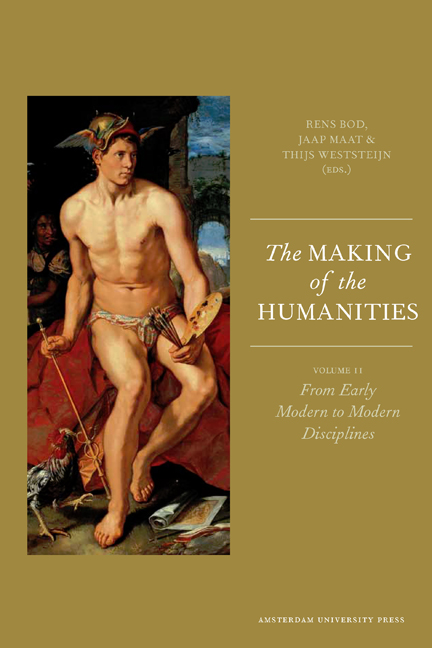Book contents
- Frontmatter
- Contents
- Introduction: The Dawn of the Modern Humanities
- I Linguistics and Philology
- II The Humanities and the Sciences
- III Writing History and Intellectual History
- IV The Impact of the East
- V Artworks and Texts
- VI Literature and Rhetoric
- VII Academic Communities
- Contributors
- List of Figures
- Index
The Afterlife of Rhetoric in Hobbes, Vico and Nietzsche
Published online by Cambridge University Press: 19 January 2021
- Frontmatter
- Contents
- Introduction: The Dawn of the Modern Humanities
- I Linguistics and Philology
- II The Humanities and the Sciences
- III Writing History and Intellectual History
- IV The Impact of the East
- V Artworks and Texts
- VI Literature and Rhetoric
- VII Academic Communities
- Contributors
- List of Figures
- Index
Summary
Introduction
If one is looking for a model of the history of rhetoric in early modernity written as a history of decline, then one could do much worse than Bryan Garsten's Saving Persuasion: A Defense of Rhetoric and Judgment, published in 2006. There the commonplace is repeated that, in the seventeenth and eighteenth centuries, rhetoric came to be regarded with deep suspicion. And that is certainly true, at least in some sense. Almost despite himself, however, Garsten also succeeds in demonstrating that the criticisms of rhetoric developed by his synecdoches for early modernity – Hobbes, Rousseau and Kant – were not only attacks on rhetoric's suspect duplicity but also creative reformulations of rhetorical issues and tactics of analysis. There are insights in Garsten's account (not least the emphasis on Rousseau's ‘persuading without convincing’), but I would argue that his mistake is quite simple and fundamental. Moreover, it is one that we repeat incessantly. He accepts the description of rhetoric as the art of persuasion – indeed submerges the discipline into ‘speech designed to persuade.’ The better definition, however, is Aristotle’s: rhetoric's ‘function is not so much to persuade, as to find out in each case the existing means of persuasion.’ Before – or instead of – being an art, rhetoric is thus a basic mode of humanistic inquiry. Dunamis not technē.
The notion that rhetoric is an art of persuasion is hardly unusual, though. It is evidence of a forgetting that has become second nature by force of repetition. And much of the rhetorical tradition in early modern Europe certainly was repetitious. It is a basic historical irony that, as a rule, the most conspicuous points of postantique reception for Greco-Roman rhetorical materials will also often be among the least innovative. As genres, handbooks and lecture courses habitually verge on what, to modern eyes, may look like plagiarism, yet without them a significant amount of what is thought of as conceptually most potent and most novel in early modern thought simply would not exist. Historical interpretation of such documents must embrace a tension: it must remain aware that there is such a thing as conceptual inertia, and yet be mindful that no translation, paraphrase, or redaction can be purely repetitious.
- Type
- Chapter
- Information
- The Making of the HumanitiesVolume II: From Early Modern to Modern Disciplines, pp. 337 - 354Publisher: Amsterdam University PressPrint publication year: 2012



